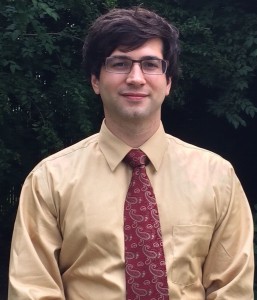Special Collections profiles researchers that have consulted collections in the department. Stony Brook University graduate Matthew M. Montelione earned his M.A. in History and is currently a research assistant to professor Dr. Jennifer Anderson.
My name is Matthew M. Montelione. I was born and raised in Suffolk County. In 2011, I attained a combined BA degree in History and Secondary Education from St. Joseph’s College in Patchogue. In December 2014, I earned a Master’s degree in History from Stony Brook University. I am currently working as a Research Assistant for Dr. Jennifer Anderson, who was my chief advisor at Stony Brook.
Suffolk County in the American Revolution is my area of study. In specific, my ongoing research focuses on the local experiences of Loyalists on eastern Long Island to expose the grim social, political, and religious realities of the war. My chief character is Colonel Richard Floyd IV of Mastic, who in 1775 owned over five hundred acres of land in Suffolk County, but lost it all at conflict’s end due to his intense loyalty to the Crown.
I combed through the Microfilm Collection of the Institute for Colonial Studies, State University of New York at Stony Brook, reel HK. This extensive microfilm collection contains scans of valuable and virtually unseen documents from the archives of the Manor of St. George on the Mastic Peninsula. During the American Revolution, the manor was the home of Judge William Smith, who in 1775 identified as a Patriot. In 1780, the British turned Smith’s estate into an impressive fort, intended to protect Suffolk County residents and Crown supplies from marauding pirates and Patriots. After the Revolutionary War, the property was returned to the family, and many subsequent generations of Smiths lived on the estate. Consequently, the reel contains a wealth of late eighteenth-century documents which enriched my understanding of revolutionary Long Island. I learned how easy it was to discover valuable primary sources at Stony Brook University. The microfilm machines located in the library work very well and are easy to use.
My experience doing original research at Stony Brook University was wonderful. Kristen Nyitray of Special Collections and University Archives went above and beyond to aid me in my quest for sources, and I am indebted to her kindness and helpfulness.
Archives are the lifeblood of original research. At the archives, inquiries develop into compelling historical arguments. Take your time in locating and studying materials, especially because many older documents may be hard to decipher at first glance. Stony Brook’s sources were particularly helpful to me due to my area of research. Special Collections and University Archives house a vast array of collections.
For more information about Special Collections and University Archives, please visit the website for the department.
Kristen Nyitray
Latest posts by Kristen Nyitray (see all)
- Spring 2024 Art Crawl Recap - March 28, 2024
- #SBUGivingDay is Here! Support SBU Libraries in Digitizing Dan’s Papers - March 27, 2024
- Join Us on the Art Crawl: Wednesday March 27 from 12pm to 3pm - March 18, 2024


